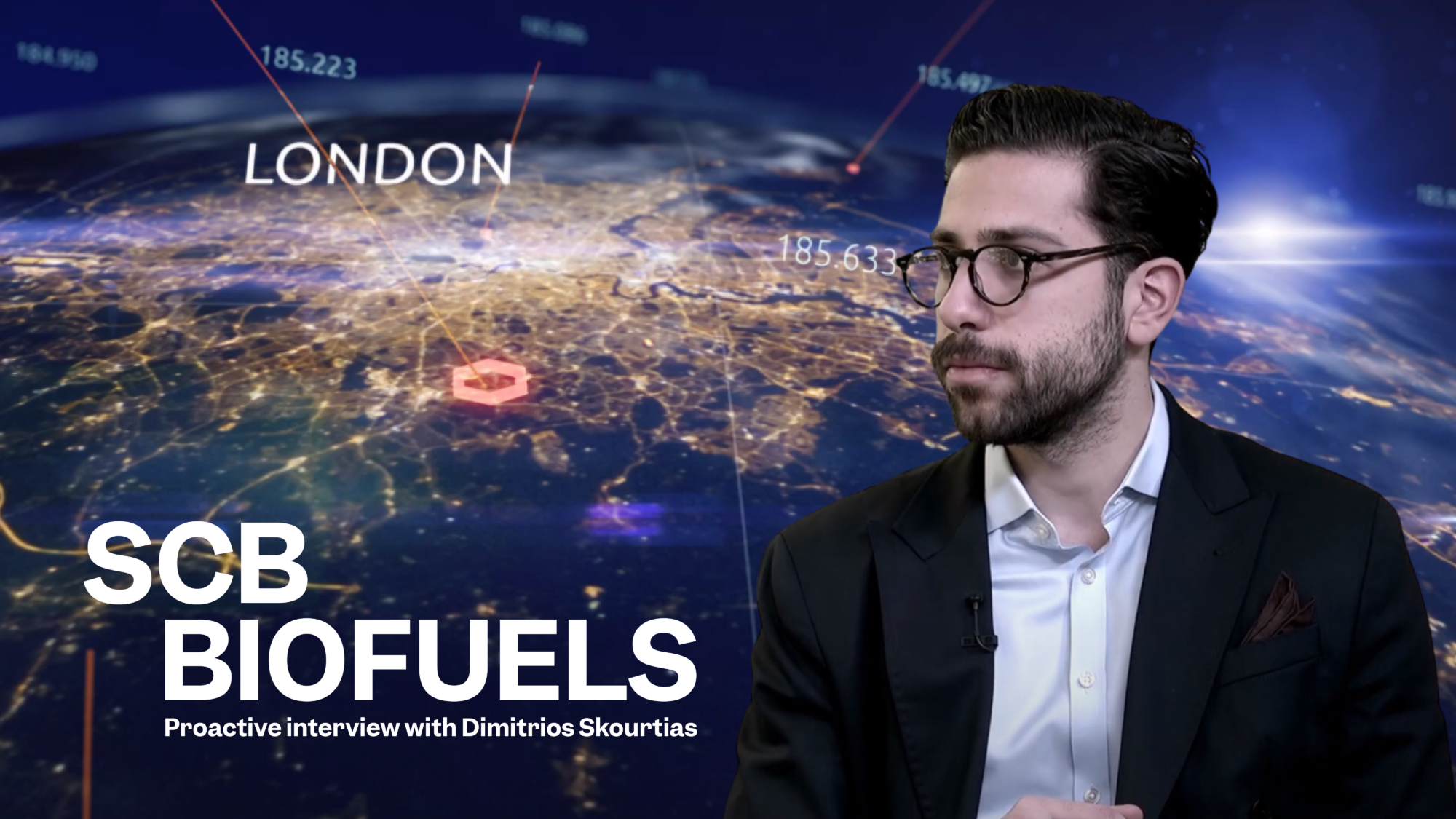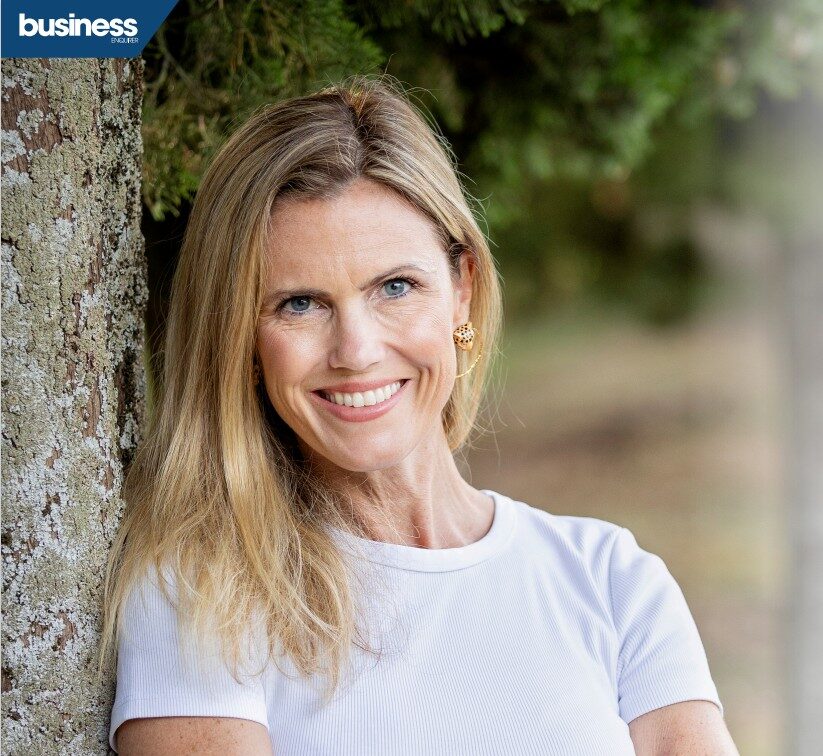SCB’s Biofuel Broker Dimitrios Skourtias was interviewed for Proactive by Broadcast Presenter Thomas Warner. The interview features important insights into biodiesel brokering fundamentals, as well as the latest regulatory and market developments.
Dimitrios describes biofuels as the “most effective and…least cost-intensive way to tackle environmental problems.”
Dimitrios: SCB Group is the largest brokerage in biofuels. We started brokering biodiesel from 2006.
With these years of presence, we are the biggest in the biodiesel side on the physical and on the derivatives aspect of the business. We evolved another desk as well, we are brokering ethanol, battery materials, we are big on veg oils, on the derivatives side as well.
We act as principal on carbon offsets transaction, we moved on that area as well, so SCB Group has a global presence in the environmental markets. We have offices in Geneva, the Headquarters. We have London offices as well, which I’m working from. Puerto Rico, Singapore, and Chicago. We have a global presence in that market and we’re looking to expand in other products as well.
Myself I’ve been working in SCB for the past four years now, on the physical biodiesel desk. We are focussed on linking the buyers and sellers on the biodiesel side trying to give transparency into the market on the pricing side but on the regulations and the specifications of the product.
We’ve been trading quite a lot of volumes in the main hubs, Amsterdam, Rotterdam, Antwerp, but in other markets as well, in the Mediterranean. We try to help our clients with international arbitrage, from China, as we’re going to discuss. Different regulations in other countries as well like specifically in Germany, in France. So we have a global presence in that market, specifically on the biodiesel side, we are really happy to say that we have a very good place in the market.
Proactive: Great stuff, and it is a growing market, biofuels is the subject of a lot of focus at the moment. And it is an extremely complex market, not made any simpler by the emergence of this conflict in Ukraine recently. So what has that meant for the business?
Dimitrios: The war in Ukraine had a peculiar result in the market. Obviously, the supply shortage of veg. oils affected a lot the margins for producers. Producers of biodiesel that were producing using rape seed or sunflower oil. So during the first months of the war, we have seen increasing prices in every commodity, specifically in the energy commodities. But margins were not that great for the crop-based biodiesel producers.
Now and after some months we have some supply coming on the rape seed side and that helps a lot the market. We have seen producers coming to the market, trying to sell their product, in really attractive levels, premiums, sometimes even discounts. We have seen this market going up in terms of liquidity and volume. Specifically in the areas of Germany for the biodiesel; and Amsterdam, Rotterdam and Antwerp (ARA).
So when we are discussing about biodiesel, there are two specific things that we need to bear in mind first to understand the product and the way it is trading. One is the specification of the product. And the other one is the regulation spot on the physical biodiesel and that’s why I believe the role of a broker is really important in that market, since you need transparency in these two things that are really complex as we discussed already.
So the regulations part was affected at some part from the Ukranian war, the general consensus and the general target for regulations is to abandon the crop-based products, and to move towards a waste, feed-stock future for biodiesel.
The difference between these two, just for you to have an idea and a metric, is the crop-based biofuels, biodiesel specifically, can save up to 60% of greenhouse gas emissions, compared to the fossil fuel equivalent. Whereas the waste-based can save up to 90% for example. So the regulations for each country, each main market in the European Union are moving towards that.
We have seen that in Germany we have seen that in France as well. So yes the Ukrainian war had an impact on specific products during the time that we were seeing these developments. But then at the same time I believe it will have a more long-term impact.
Proactive: It’s unbelievably fascinating. That complexity that we’ve mentioned is being added to by the fact that the pace of regulatory change in different countries within Europe differs. So we’ve got different things going on in France, different things going on in Germany and that’s something you have to manage isn’t it?
Dimitrios: As a broker we need to understand the market dynamics because obviously the big market players, the obligated parties, that need to buy biodiesel in order for them to comply with regulations in each market, the German and the French, the Dutch market, they have systems in all of these countries, so a physical broker needs to have an understanding as to how much a supply and demand is affected by the regulation that we have in each market.
The German market decreased from 2022 the crop-based biofuels cap on the mix for the end user to comply with this regulation. And then at the same time you have the French market banning Palm and Soy POSs, with the main focus being the rape seed. So we have seen premiums for rape seed oil biodiesel going from $200 above the standard grade, down to $20 and up again, so it’s a really volatile market. That’s why I believe that a broker’s position is to understand these market dynamics this elasticity between supply and demand specifically on these kinds of aspects of the business. In order for him to give the information to the client as needed.
So for the German market specifically – except the part that we are moving towards a lower cap on the crop base. We have seen an abandonment of palm oil as feed stock. It was the first feed stock used because the supply was enough, especially from Asia. It’s been abandoned at the moment.
So there are complex markets especially on the regulation side, on the sustainability side of the product. But then at the same time we need to understand that different feed stocks yield a different specification for the biodiesel produced. So rape seed for example is the feed stock that we need to use for the winter months. And palm for example cannot be used for these kind of months.
The German market is more specific for the specification used, winter and summer, for French and Spanish markets we have more leniency on the specification. That’s why it is a complex market. And the regulation sometimes is not compatible with the specification that the end user needs.
Proactive: One of the main outcomes of this incredible complexity and volatility is that it’s incredibly disruptive to establish patterns of trade. You must see from your vantage point embedded in the market dramatic change in the trade flows.
[8.56] Dimi: These regulations and the specification requirements of the end user is the main driver of the main trade flows that we see in the arbitrage that the clients are taking advantage of at the moment. So as we discussed, yes, for example, palm oil is being abandoned in the main market, the German market, the French market. So we see less and less palm oil or palm-oil based methyl ester – or biodiesel – from the main markets, main producers in Indonesia and Malaysia. These markets they are still domestically supplying the end user with palm oil-based biodiesel. They have a B30 mandate, which means 30 percent of the volume that you’re using in the pump, is biodiesel produced from palm oil. But that is more to boost the local economy.
That is a specific example, another is the premiums on the rape seed oil POS for the French market. The different pricing premiums for the different GHG savings of biodiesel in Germany. Germany has a GHG mandate. Which means that different grades of biodiesel save more or less greenhouse gas emissions to that market and obviously the premiums for each product is different according to how much greenhouse gas emissions they can save.
Dimitrios: We have seen these trade flows coming from Indonesia and Malaysia on the palm oil. We have a lot of waste products, in the previous years coming from China and Asia, specifically to the UK. Since there is a tax benefit from China for the waste-based products. At the moment, with freight rates going higher, especially after Covid, it’s difficult to find and take advantage of that arbitrage, but that trade flow I believe is still there and will continue to happen on the biodiesel market.
We have other products interconnecting with biodiesel. The conventional biodiesel as we knew that up to now. So with technology evolving, we have different products coming like Hydrotreated Vegetable Oil (HVO), Sustainable Aviation Fuel, and the trade flow we see really often these days is feedstock, like used cooking oil and other wastes, coming from Asia, but to produce these kinds of products, hydrogen, vegetable oil and sustainable aviation fuel.
Proactive: It is so interesting, I’ve just got one final question for you Dimitrios, we’ve seen this week that BP are going to be rolling back a little bit from their green energy commitments because they’re struggling to find money in it, basically. Do you think we’re going to see something similar with biofuels or do you still think we’re going to see that market growth, which has characterised the market over the past five or ten years.
Dimitrios: Investment in a sector is different from participating in a renewable market. Biodiesel will still be there. The end user and the oil companies cannot get away from it. Because the regulations as we said impose for the oil companies to use biodiesel in the mix. So I’m positive that volumes for biodiesel generally are going to be increasing.
But there are changes and there are innovations that they are going to happen to optimise performance of the fuel. And the price obviously for the end user. As we discussed before. HVO and Sustainable Aviation Fuel for example can be the fuel of the future. So all these feedstocks that we have at the moment used to produce conventional biodiesel are going to be used in HVO more and more.
We are talking about investment from an oil company in that, but in the long run, this is going to be of a huge benefit for them in terms of pricing of course. But in terms of performance of the fuel as well. So I don’t believe on the biodiesel side we are going to see a cut. I believe on the contrary the volumes are going to be increased. Because biofuel is the most effective, the less cost intensive alternative to tackle environmental problems.
At the same time regulations are increasing volume, I’m sure this fascinating market will continue to evolve. And increase in volumes in the coming months and years.
View the interview on the Proactive website here: https://www.proactiveinvestors.co.uk/companies/news/1005784/scb-group-broker-expects-biofuel-production-to-continue-rising-1005784.html



